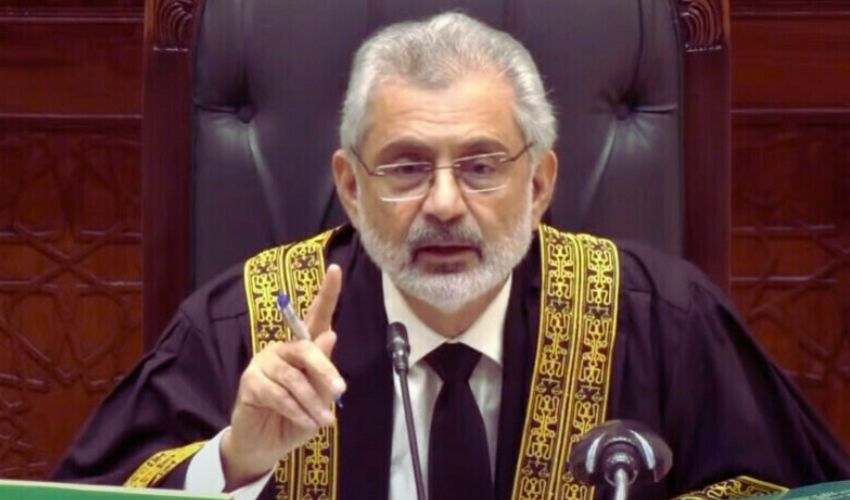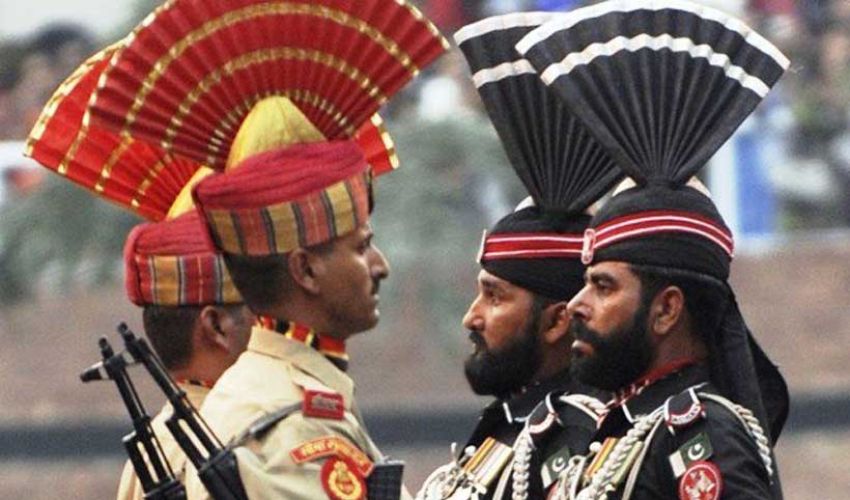The Supreme Court has adjourned the hearing of a case related to the duration of disqualification of public office holders under Article 62(1)(f) till Thursday, while during the hearing Chief Justice of Pakistan (CJP) Qazi Faez Isa remarked that "if all these conditions existed back then, Quaid-e-Azam Muhammad Ali Jinnah would also be disqualified".
On Tuesday, a seven-member bench of the Supreme Court, headed by CJP Isa and comprising Justice Mansoor Ali Shah, Justice Yahya Afridi, Justice Aminuddin Khan, Justice Jamal Mandokhel, Justice Muhammad Ali Mazhar and Justice Musarrat Hilali, heard the case related to the determination of period of disqualification under Article 62(1)(f) of the Constitution.
The Attorney General for Pakistan Mansoor Usman Awaz supported restricting the disqualification period to five years as per the Elections Act and also supported proposed legislation to fix the disqualification period to five years under Article 62(1)(f).
The AGP sought reconsideration of the decision on lifetime disqualification of public officials. He then read out article 62, 63 of the Constitution and the constitutional requirements for eligibility to become a lawmaker and their disqualification. He further said that conditions under both articles 62 and 63 were considered at the time of submitting nomination papers.
Both articles applied at the time of entry, he further said.
“Some clauses are related to facts, and they are simple, while others are difficult as the ones about good character,” the CJP remarked, adding that possessing adequate knowledge of Islamic teachings is also a requirement.
“I don't know how many people will be able to pass this test,” he further said, adding that the Constitution did not even say that one must be a graduate to become a member of the assembly. “Later, such a law was probably enacted during the tenure of Pervez Musharraf.”
In the Samiullah Baloch case, the Supreme Court said that since the period of disqualification was not fixed, it was for life, the chief justice remarked. He asked if it was possible to accept the five-year disqualification law without touching this decision.
He then asked which of the petitioners supported lifetime disqualification. Petitioner Sanaullah Baloch, Advocate Khurram Raza and Usman Karim responded in the affirmative.
The CJP asked if the Samiullah Baloch decision can be revisited. The AGP replied that in that case, the court ignored a point; it said that in a criminal case, a person goes to jail also after being sentenced, so the disqualification period was short.
“The court did not see that a declaration remains in field both in criminal cases and under Article 62(1)(f),” the AGP said.
“How can one's character be determined?” asked the CJP. According to Islamic standards, no one could claim a great character, and Article 62 did not specify the period of disqualification but it was decided by the court, he added. Chief Justice
“A declaration of lifetime disqualification stands in place as long as there are court decisions,” the AGP replied.
Justice Mansoor Ali Shah asked if the Constitution had to be amended to overturn the Supreme Court's decision, and if what is written in the Constitution can be changed through legislation.
Justice Muhammad Ali Mazhar remarked that Article 62(1)(f) of the Constitution did not mention the period of disqualification.
The Supreme Court said in its decision that as long as the court decision exicted, the disqualification will remain for life, the AGP said.
“In serious crimes like murder and treason, you can contest elections after some time,” Justice Shah remarked, asking if lifetime disqualification seemed appropriate over trivial reasons.
“Did the Supreme Court use the declaration using suo motu powers?” asked Justice Mazhar.
The CJP remarked that under Article 63(1)(g), the disqualification of a person who violated national integrity and ideology was five years.
“If a person was booked in a case he can return after two years,” AGP Awan said, adding that if there was no case but a declaration, he could not return.
“Can a person swear on oath he has good character?’ asked the CJP.
“If a person becomes a good person after 20 years and becomes a religious scholar, will his character be deemed good?” Justice Shah questioned, asking that if someone delivered a speech against the country, could he contest elections even today.
On being asked by the CJP, the AGP read out Article 62(1)(d), according to which a person was eligible for elections if he had good character and did not violate Islamic injunctions.
“If a person of good character cannot waste something, then a person who wastes water during ablution is also ineligible,” the CJP remarked. “A Muslim cannot use the words sadiq and ameen for anyone except Prophet Muhammad (PBUH).”
“If all these conditions existed previously, even the Quaid-e-Azam would have been disqualified,” CJP Isa said. “Islam also has room for repentance.”
Justice Jamal Mandokhel asked where the period of disqualification was mentioned in Article 62(1)(f).
“If you waste a lot of water while performing ablution, it is a negation of the hadith,” the CJP said, adding that the strict eligibility criteria for parliamentarians did not apply to the judges.
“When unelected people make laws, this is what happens,” Justice Mandokhel remarked.
The CJP asked if Article 62(1)(f) applied in criminal cases if the court declares a person to be a liar on misleading the court.
Supreme Court Bar Association President Shahzad Shaukat told the court he supported the law on disqualification period.
Counsel for petitioner Usman Karim said as long as the Samiullah Baloch decision existed, a new law could not be enacted.
He then told the court he was in favor of lifetime disqualification as long as the Supreme Court's decision existed.
Samiullah Baloch's brother Sanaullah Baloch said he believed in judicial supremacy, to this, the CJP asked him what he meant.
Justice Shah said it was written in the Constitution that there will be disqualification for life on the basis of lies. “In cases of murder and treason, one can participate in elections after disqualification for some time,” he added.
“If someone has lied at the entry point of the election process, he will be disqualified for life,” Baloch said.
Jahangir Tareen's lawyer Makhdoom Ali Khan said he was in favor of fixing the period of disqualification for five years under Article 62(1)(f).
“In 1985, a military dictator who trampled on the Constitution added articles 62 and 63. How can a martial law administrator set eligibility criteria in the Constitution?” the chief justice questioned.



























